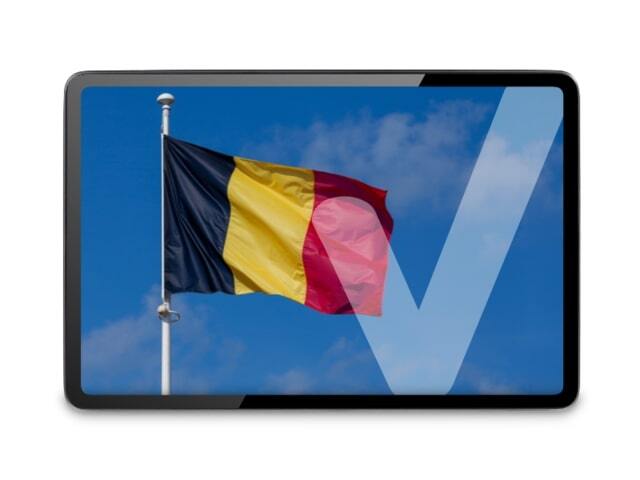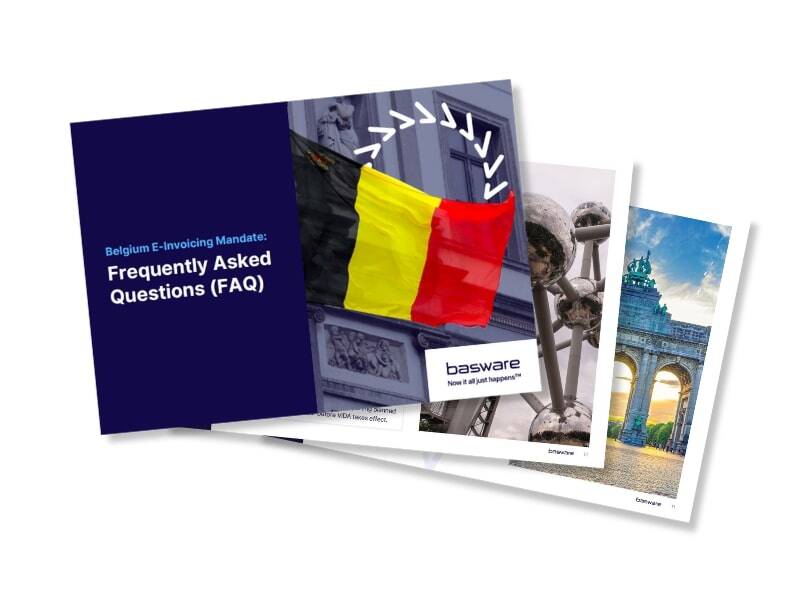- Home
- en
- compliance map
- belgium
Electronic Invoicing in Belgium
Is e-invoicing mandatory in Belgium ?
For Business-to-Business (B2B) invoicing, electronic invoicing will become mandatory as of January 2026. B2G e-invoicing is already mandatory.
Who is Affected?
The new B2B mandate will apply to all companies holding a VAT ID in Belgium, with the exception of:
- Bankrupt taxable persons in VAT
- Undertakings which only carry out transactions exempted by Article 44 of the VAT Code
- Non-taxable VAT payers in Belgium without a permanent establishment, even if they are identified for VAT purposes in Belgium
- And others
Compliance Requirements
Businesses must be prepared to send, receive, and process structured electronic invoices based on the European Standard EN16931. The Peppol network is the default way for invoice transfer, but other methods are allowed if agreed.
Frequently asked questions
Find clear answers to the most common questions about the Belgian e-invoicing mandate.
Want to learn more about e-Invoicing compliance?
Download our Global e-invoicing and Tax Compliance fact sheet here for more information.
Electronic Invoicing in Belgium
Is e-invoicing mandatory in Belgium ?
For Business-to-Business (B2B) invoicing, electronic invoicing will become mandatory as of January 2026. B2G e-invoicing is already mandatory.
Who is Affected?
The new B2B mandate will apply to all companies holding a VAT ID in Belgium, with the exception of:
- Bankrupt taxable persons in VAT
- Undertakings which only carry out transactions exempted by Article 44 of the VAT Code
- Non-taxable VAT payers in Belgium without a permanent establishment, even if they are identified for VAT purposes in Belgium
- And others
Compliance Requirements
Businesses must be prepared to send, receive, and process structured electronic invoices based on the European Standard EN16931. The Peppol network is the default way for invoice transfer, but other methods are allowed if agreed.
Frequently asked questions
Find clear answers to the most common questions about the Belgian e-invoicing mandate.
Want to learn more about e-Invoicing compliance?
Download our Global e-invoicing and Tax Compliance fact sheet here for more information.
Key deadlines
- January 1, 2026: Mandatory B2B e-invoicing for all VAT-registered companies in Belgium.
Key deadlines
- January 1, 2026: Mandatory B2B e-invoicing for all VAT-registered companies in Belgium.
Standards & Platforms
Platform
There is no centralized governmental platform through which invoices must be transmitted. However, the Belgian government requires invoices to be exchanged via the Peppol interoperability network unless otherwise agreed between the supplier and buyer.
What formats are required in Belgium?
E-invoices must comply with the EN16931 standard. The Peppol network will serve as the default channel, and the default format is Peppol BIS 3.0
Standards & Platforms
Platform
There is no centralized governmental platform through which invoices must be transmitted. However, the Belgian government requires invoices to be exchanged via the Peppol interoperability network unless otherwise agreed between the supplier and buyer.
What formats are required in Belgium?
E-invoices must comply with the EN16931 standard. The Peppol network will serve as the default channel, and the default format is Peppol BIS 3.0
Archiving in Belgium
What is the archiving requirement in Belgium?
From a Belgian VAT perspective, invoices and their copies must be stored for 10 years starting from January 1 of the year following the date of issue. Invoices related to immovable property must be archived for either 15 or 25 years, depending on specific circumstances.
Legal invoice
- For suppliers: A legal invoice is a structured e-invoice compliant with EN16931.
- For buyers: A legal invoice is a structured electronic invoice, based on the EN16931 standard.
Want to know more about Basware’s archiving services?
Download our Basware Vault fact sheet here to learn more about our flexible and scalable solution.
Archiving in Belgium
What is the archiving requirement in Belgium?
From a Belgian VAT perspective, invoices and their copies must be stored for 10 years starting from January 1 of the year following the date of issue. Invoices related to immovable property must be archived for either 15 or 25 years, depending on specific circumstances.
Legal invoice
- For suppliers: A legal invoice is a structured e-invoice compliant with EN16931.
- For buyers: A legal invoice is a structured electronic invoice, based on the EN16931 standard.
Want to know more about Basware’s archiving services?
Download our Basware Vault fact sheet here to learn more about our flexible and scalable solution.
Key Actions
- Ensure compliance – Prepare to issue and receive EN16931 compliant invoices via Peppol before January 2026
- Archive invoices – Store invoices for at least 10 years, ensuring full integrity, accessibility, and readability.
Belgian e-invoicing and archiving requirements at a glance:
| Requirement | Status | Timeline |
| B2G | Mandatory | – |
| B2B | Mandatory | From 2026 |
Supplier requirement: Issue EN 16931-compliant electronic invoices via the Peppol network in Belgium.
Buyer requirement: Belgian buyers must be capable of receiving EN 16931-compliant e-invoices through the Peppol network.
Archiving requirement: Invoices must be archived for at least 10 years. Storage must ensure readability, integrity, and authenticity, with data accessible from within Belgium.
Key Actions
- Ensure compliance – Prepare to issue and receive EN16931 compliant invoices via Peppol before January 2026
- Archive invoices – Store invoices for at least 10 years, ensuring full integrity, accessibility, and readability.
Belgian e-invoicing and archiving requirements at a glance:
| Requirement | Status | Timeline |
| B2G | Mandatory | – |
| B2B | Mandatory | From 2026 |
Supplier requirement: Issue EN 16931-compliant electronic invoices via the Peppol network in Belgium.
Buyer requirement: Belgian buyers must be capable of receiving EN 16931-compliant e-invoices through the Peppol network.
Archiving requirement: Invoices must be archived for at least 10 years. Storage must ensure readability, integrity, and authenticity, with data accessible from within Belgium.
Electronic Invoicing in Belgium
Is e-invoicing mandatory in Belgium ?
For Business-to-Business (B2B) invoicing, electronic invoicing will become mandatory as of January 2026. B2G e-invoicing is already mandatory.
Who is Affected?
The new B2B mandate will apply to all companies holding a VAT ID in Belgium, with the exception of:
- Bankrupt taxable persons in VAT
- Undertakings which only carry out transactions exempted by Article 44 of the VAT Code
- Non-taxable VAT payers in Belgium without a permanent establishment, even if they are identified for VAT purposes in Belgium
- And others
Compliance Requirements
Businesses must be prepared to send, receive, and process structured electronic invoices based on the European Standard EN16931. The Peppol network is the default way for invoice transfer, but other methods are allowed if agreed.
Frequently asked questions
Find clear answers to the most common questions about the Belgian e-invoicing mandate.
Want to learn more about e-Invoicing compliance?
Download our Global e-invoicing and Tax Compliance fact sheet here for more information.
Key deadlines
- January 1, 2026: Mandatory B2B e-invoicing for all VAT-registered companies in Belgium.
Standards & Platforms
Platform
There is no centralized governmental platform through which invoices must be transmitted. However, the Belgian government requires invoices to be exchanged via the Peppol interoperability network unless otherwise agreed between the supplier and buyer.
What formats are required in Belgium?
E-invoices must comply with the EN16931 standard. The Peppol network will serve as the default channel, and the default format is Peppol BIS 3.0
Archiving in Belgium
What is the archiving requirement in Belgium?
From a Belgian VAT perspective, invoices and their copies must be stored for 10 years starting from January 1 of the year following the date of issue. Invoices related to immovable property must be archived for either 15 or 25 years, depending on specific circumstances.
Legal invoice
- For suppliers: A legal invoice is a structured e-invoice compliant with EN16931.
- For buyers: A legal invoice is a structured electronic invoice, based on the EN16931 standard.
Want to know more about Basware’s archiving services?
Download our Basware Vault fact sheet here to learn more about our flexible and scalable solution.
Key Actions
- Ensure compliance – Prepare to issue and receive EN16931 compliant invoices via Peppol before January 2026
- Archive invoices – Store invoices for at least 10 years, ensuring full integrity, accessibility, and readability.
Belgian e-invoicing and archiving requirements at a glance:
| Requirement | Status | Timeline |
| B2G | Mandatory | – |
| B2B | Mandatory | From 2026 |
Supplier requirement: Issue EN 16931-compliant electronic invoices via the Peppol network in Belgium.
Buyer requirement: Belgian buyers must be capable of receiving EN 16931-compliant e-invoices through the Peppol network.
Archiving requirement: Invoices must be archived for at least 10 years. Storage must ensure readability, integrity, and authenticity, with data accessible from within Belgium.
Subscribe to the e-Invoicing Compliance News Blog!
Find e-invoicing compliance and regulatory updates by country:
Africa
Asia
China | India | Indonesia | Japan | Kazakhstan | Malaysia | Philippines | Saudi Arabia | Singapore | South Korea | Turkey | United Arab Emirates | Vietnam
Europe
Albania | Andorra | Austria | Belgium | Bulgaria | Czech Republic | Denmark | Estonia | Finland | France | Germany | Greece | Hungary | Iceland | Ireland | Italy | Latvia | Liechtenstein | Luxembourg | Malta | Netherlands | Norway | Poland | Portugal | Romania | Serbia | Slovakia | Slovenia | Spain | Sweden | Switzerland | United Kingdom
North America
Canada | Colombia | Costa Rica | Ecuador | Mexico | Panama | United States
Oceania
Keep up to date with e-Invoicing in Belgium
The Countdown to Belgium’s E-Invoicing Mandate: Where Do Companies Stand?
With just 100 days to go, Belgium’s e-invoicing mandate is approaching fast. Starting 1 January 2026, all companies performing domestic B2B transactions must...
Your Questions Answered: Belgium's E-Invoicing Mandate FAQ
As the January 1, 2026 deadline for Belgium's e-invoicing mandate approaches, many businesses are asking the same question: How can we ensure compliance? To...
Understanding Belgium's E-Invoicing Mandate: Latest Changes and Key Insights for Finance Professionals
Belgium is poised to transform its tax reporting system with the introduction of mandatory e-invoicing, set to take effect on January 1, 2026. This significant...



